人教版(2019)必修第三册Unit2 Morals and Virtues Discovering Useful Structures 课件-(共33张PPT)
文档属性
| 名称 | 人教版(2019)必修第三册Unit2 Morals and Virtues Discovering Useful Structures 课件-(共33张PPT) | 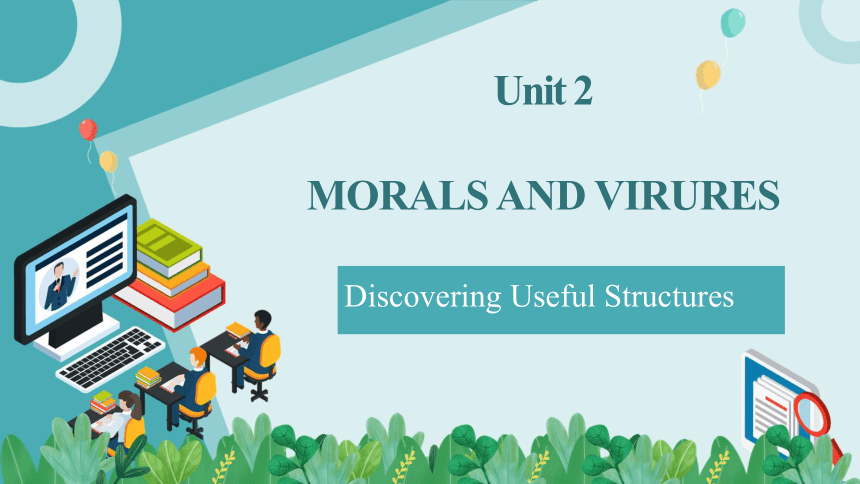 | |
| 格式 | pptx | ||
| 文件大小 | 4.9MB | ||
| 资源类型 | 教案 | ||
| 版本资源 | 人教版(2019) | ||
| 科目 | 英语 | ||
| 更新时间 | 2024-09-06 20:27:14 | ||
图片预览

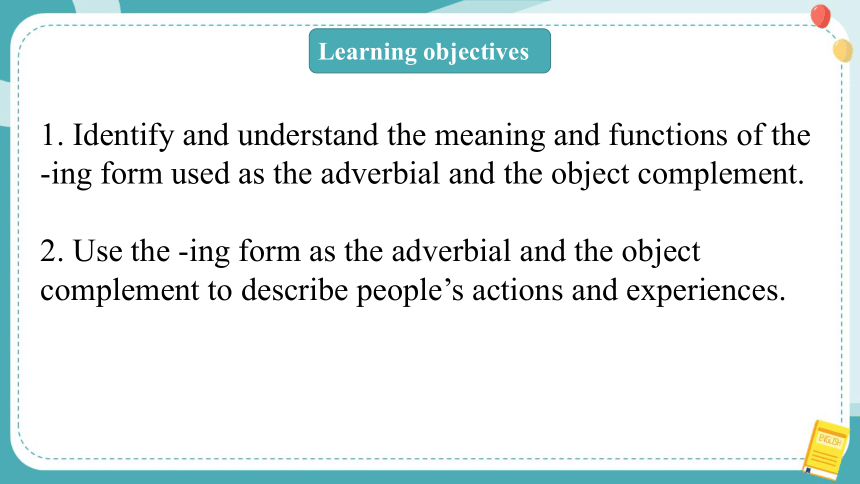
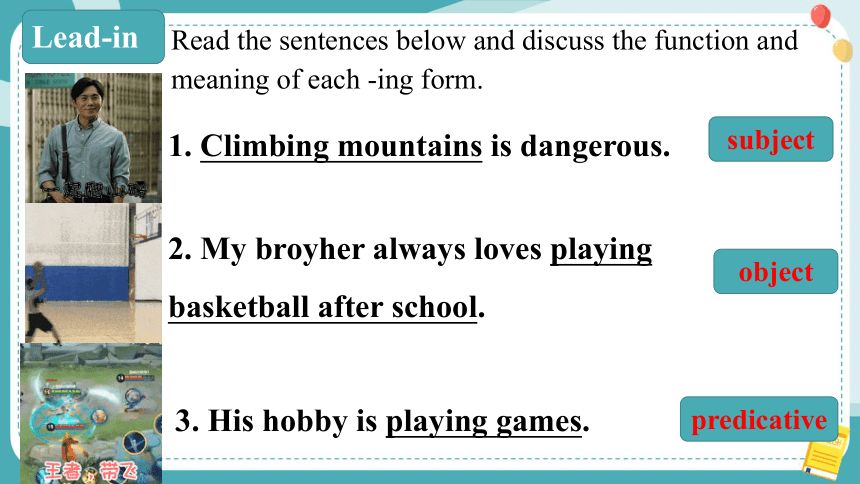
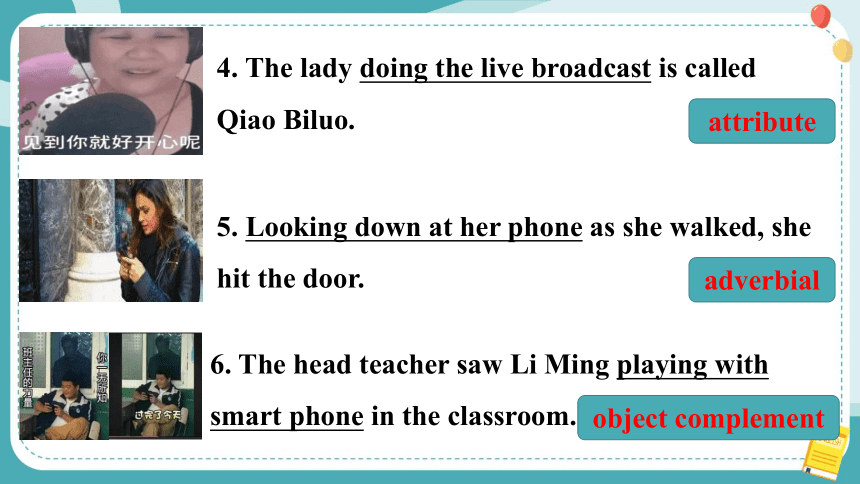
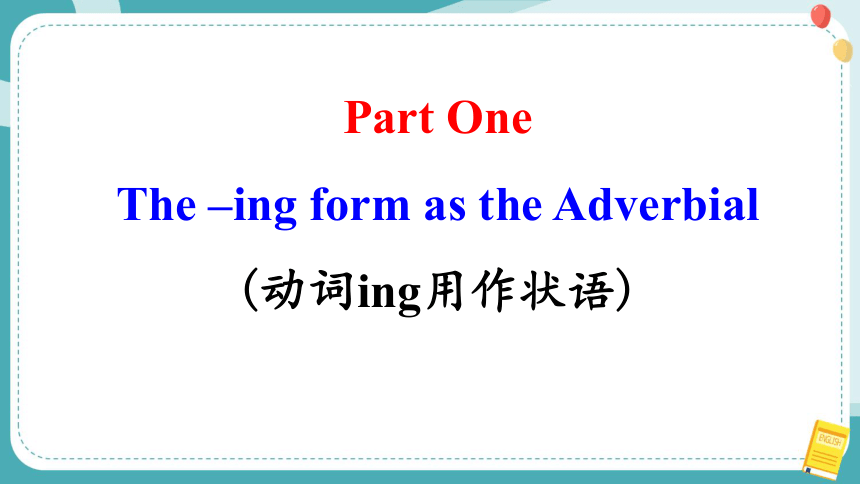

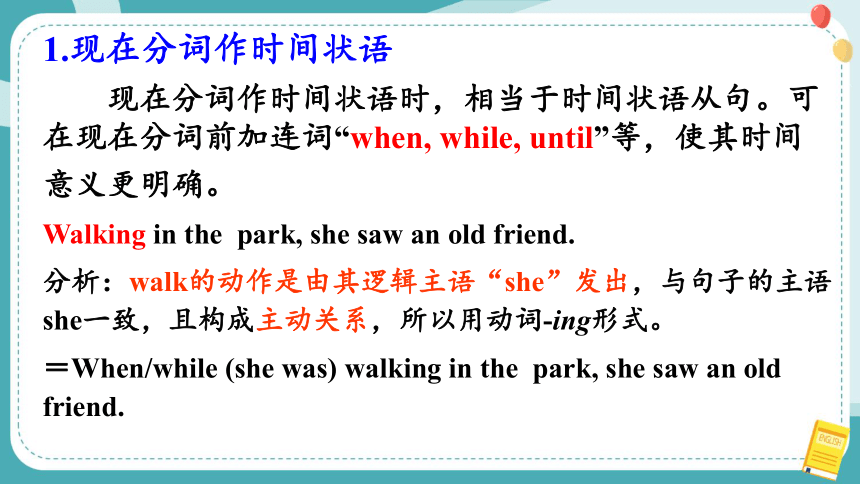
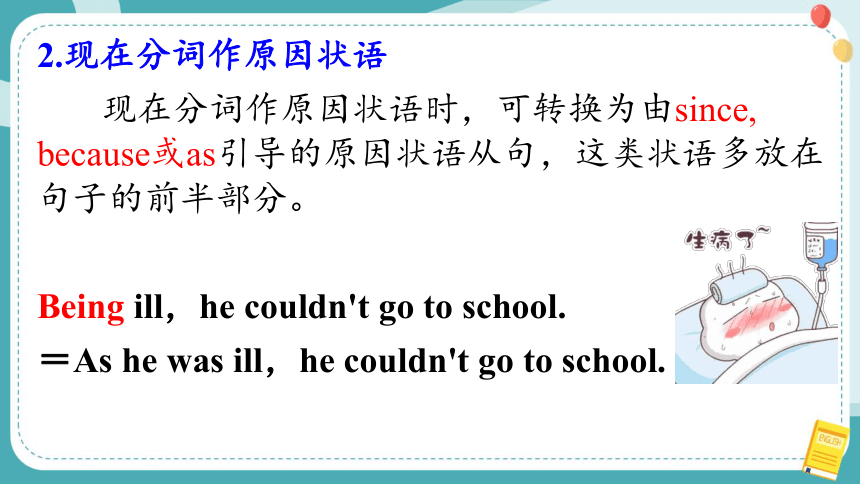
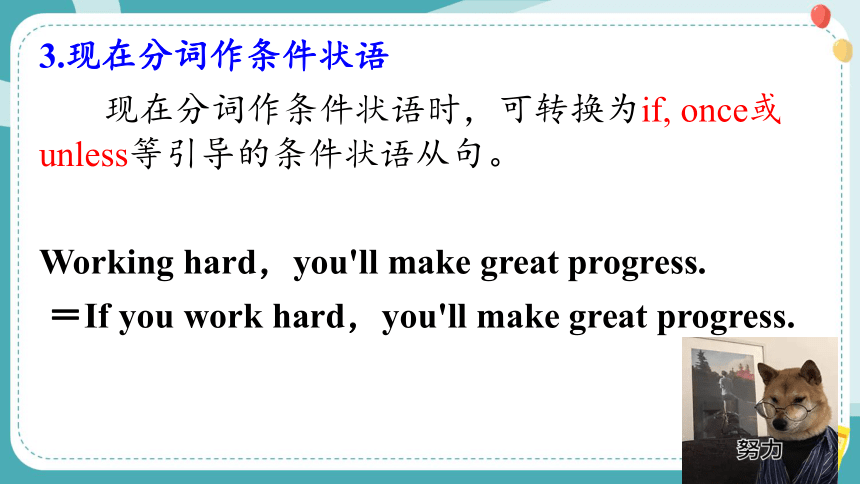
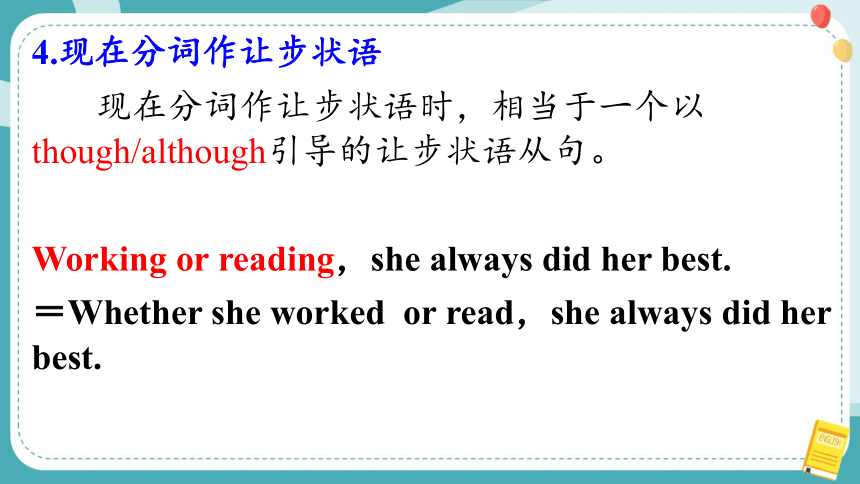
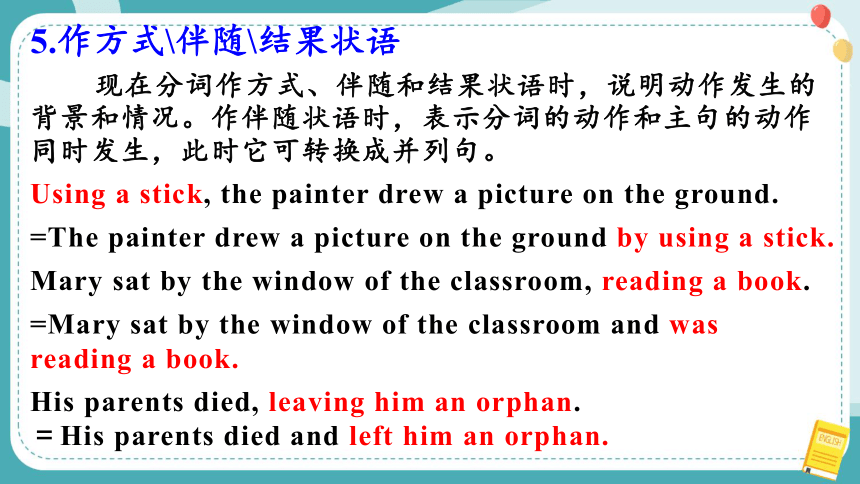
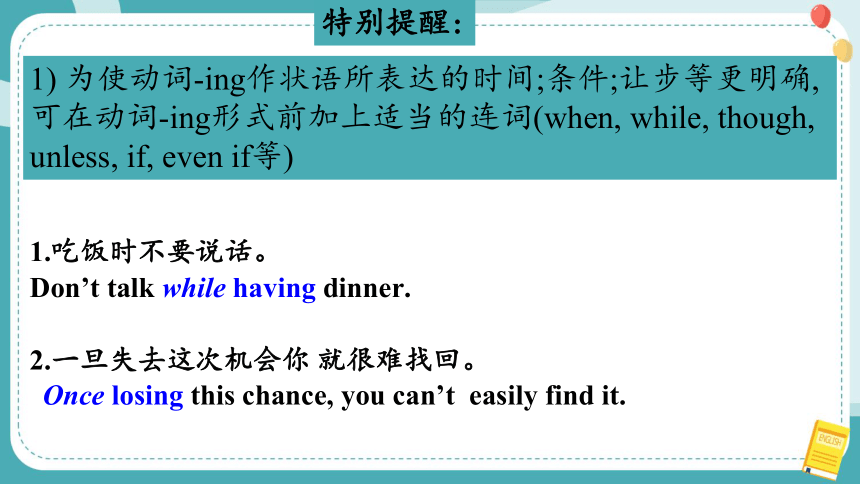
文档简介
(共33张PPT)
Unit 2
MORALS AND VIRURES
Discovering Useful Structures
Learning objectives
1. Identify and understand the meaning and functions of the -ing form used as the adverbial and the object complement.
2. Use the -ing form as the adverbial and the object complement to describe people’s actions and experiences.
Read the sentences below and discuss the function and meaning of each -ing form.
Lead-in
1. Climbing mountains is dangerous.
subject
2. My broyher always loves playing basketball after school.
object
3. His hobby is playing games.
predicative
4. The lady doing the live broadcast is called Qiao Biluo.
attribute
5. Looking down at her phone as she walked, she hit the door.
adverbial
6. The head teacher saw Li Ming playing with smart phone in the classroom.
object complement
Part One
The –ing form as the Adverbial
(动词ing用作状语)
现在分词用作状语
现在分词作状语(修饰动词)时, 可表时间、原因、条件、方式、伴随、让步等情况。
1.现在分词作时间状语
现在分词作时间状语时,相当于时间状语从句。可在现在分词前加连词“when, while, until”等,使其时间
意义更明确。
Walking in the park, she saw an old friend.
分析:walk的动作是由其逻辑主语“she”发出,与句子的主语she一致,且构成主动关系,所以用动词-ing形式。
=When/while (she was) walking in the park, she saw an old friend.
2.现在分词作原因状语
现在分词作原因状语时,可转换为由since, because或as引导的原因状语从句,这类状语多放在句子的前半部分。
Being ill,he couldn't go to school.
=As he was ill,he couldn't go to school.
3.现在分词作条件状语
现在分词作条件状语时,可转换为if, once或unless等引导的条件状语从句。
Working hard,you'll make great progress.
=If you work hard,you'll make great progress.
4.现在分词作让步状语
现在分词作让步状语时,相当于一个以though/although引导的让步状语从句。
Working or reading,she always did her best.
=Whether she worked or read,she always did her best.
5.作方式\伴随\结果状语
现在分词作方式、伴随和结果状语时,说明动作发生的背景和情况。作伴随状语时,表示分词的动作和主句的动作同时发生,此时它可转换成并列句。
Using a stick, the painter drew a picture on the ground.
=The painter drew a picture on the ground by using a stick.
Mary sat by the window of the classroom, reading a book.
=Mary sat by the window of the classroom and was reading a book.
His parents died, leaving him an orphan.
=His parents died and left him an orphan.
特别提醒:
1) 为使动词-ing作状语所表达的时间;条件;让步等更明确,可在动词-ing形式前加上适当的连词(when, while, though, unless, if, even if等)
1.吃饭时不要说话。
Don’t talk while having dinner.
2.一旦失去这次机会你 就很难找回。
Once losing this chance, you can’t easily find it.
2) 动词-ing形式作状语时,其逻辑主语必须与句子的主语一致.
1. Looking out of the window, the garden was beautiful.
Looking out of the window, we found the garden beautiful.
2. While reading the book, the telephone rang.
While she was reading the book, the telephone rang.
3)当--ing表示的动作发生在谓语动词之前时,应使用完成式: having done. 否定式在前加not.
1. 做完了作业,他冲出去打篮球。
Having done his homework, he rushed out to play basketball.
2. 写好了信,他出去邮寄它。
Having finished the letter, he went to post it.
3. 由于没有认真学习,他考试失败了。
Not having studied his lessons very hard, he failed the test.
4) 当--ing与句子的主语存在逻辑上的动宾关系时,-ing分词要用被动形式。
1. Having been criticized by the teacher, he gave up smoking.
2. Being questioned by the teacher, she felt
very upset.
5) V–ing 用于某些固定搭配中,表示说话人的态度;观点等,如:generally speaking, frankly/honestly speaking, judging by/from, considering/seeing, supposing等
1. Generally speaking, girls are more careful than boys.
2. Supposing it rains, we will put off the sports meeting.
3. Judging from his accent, he must be from the north.
6) 现在分词和过去分词做状语的区别。
1. __________for a long time, the watch looks old.(use)
__________the watch, I fiind it very useful.(use)
2. ______from the top of the mountain, we find the city beautiful.(see)
_______from the top of the mountain, the city looks beautiful.(see)
Used
Using
Seeing
Seen
过去分词与句子的主语之间在逻辑上的_______关系,即表________;
现在分词与句子的主语之间在逻辑上的_______关系,即表________;
被动
动宾
主谓
主动
1. Hearing the news, they immediately set off for Shanghai.
2. Being tired, I stopped to have a rest.
3. The snow lasted a week, resulting in serious traffic confusion in the whole area.
4. Complete the following sentences using suitable verbs from the text.
5. She stood there, listening to the wind and watching the rain.
6. Admitting what she has said, I still think that she hasn’t tried her best.
Exercise
时间状语
原因状语
结果状语
方式状语
伴随状语
分析现在分词在句中的功能
让步状语
1.______________(try) many times, he still couldn't overcome the difficulties.
2.____________ (eat) at the cafeteria before, Tina didn't want to eat there again.
3.Unless ______ (see) the changes with your own eyes, you will never believe their greatness.
4.His car broke down on the way, thus ________ (cause) him to be late for the election.
5.Tom walked away, __________ (complain) about the cold weather.
用所给词的适当形式填空。
Having tried
Having eaten
seeing
causing
complaining
6.There are many goods, ________ (range) from food and drink to some electronic products.
7.You have to prepare the next question ___________ (depend) on what the person says.
8.________ (walk) in the street with his dog following him, he felt really free and pleased.
9._____________ (finish) his work, he went out into the garden to have a walk.
10. The child lay on her mother’s lap,_________sweetly.(smile)
ranging
depending
Walking
Having finished
smiling
Part Two
The –ing form as object complement
(动词ing用作宾补)
I could hear it raining.
Listen to the birds singing.
Can you smell something burning?
We looked for Paul and finally we found him sitting under a tree eating an apple.
在感官动词see, hear, feel, smell, watch, notice等后作宾补,表示动作____________,并非全过程。宾语和宾补之间是_________关系。
docerID:327037375
1.感官动词+宾语+v-ing宾补
正在进行
主动
see sb doing 与see sb do
Tom got into his car and drove away. You saw this.
You can say:
I saw Tom get into his car and drive away.
Somebody did something
I saw this
I saw somebody do something
+
Yesterday you saw Ann. She was waiting for a bus.
You can say:
I saw Ann waiting for a bus.
somebody was doing something
I saw this
+
I saw somebody doing something
In order to keep warm, we kept the fire burning all night long.
Don’t have the water running when you brush your teeth.
Don’t leave her waiting outside in the rain.
使役动词keep ,get, leave,have 等后作宾补,表示“使/另/让...一直做某事。”
2.使役动词+宾语+v-ing宾补
3. with+宾语+v.ing宾补
1. With the time passing by, he almost forgot everything in the past.
2. Mrs. Deng entered the classroom, with a group of students following her.
3. With so many people looking, she felt nervous.
现在分词和过去分词做宾补的区别。
1. We saw the thief __________by the police.(catch)
We saw the police ___________the thief.(catch)
caught
catching
过去分词与句子的主语之间在逻辑上的_______关系,即表________;
现在分词与句子的主语之间在逻辑上的_______关系,即表________;
被动
动宾
主谓
主动
Exercise
用所给词的适当形式填空。
1. When I was on my way to school this morning, I saw two women ________ (sell) lanterns.
2. The operator left hurriedly with the machine ________ (run).
3. On the bank of the river, we found him ________ (put) on a tent, with a dog ________ (lie) on the grass.
4. Peter, a colleague of mine, was standing on the bridge and watching boats ________ (pass) by.
selling
running
putting
lying
passing
5. Don't leave her ________ (wait) outside in the rain.
6. After a knock at the door, the child heard his mother's voice ________ (call) him.
7. With the pianist _____________ (perform) music on the stage, the atmosphere is quite romantic.
8. When I came in, I saw Linda ____________ (whisper) to Danny.
9. The sound of the gun made the birds ______ (fly) away.
10. I can't get the car _________.(work)
waiting
calling
performing
whispering
flying
working
Test for goals
用所给单词的适当形式填空。
feel want face smile return worry hear knock
1. that his wife had been injured in an accident, Mr Johnson hurried to the hospital.
2. During the operation, she sat in the waiting room for over an hour _________about him.
3. I saw her whispering something into his ear, obviously not ________ to be heard.
Hearing
worrying
wanting
feel want face smile return worry hear knock
4. He suddenly woke up at midnight when he heard someone
at his door.
5. higher import and export costs, the company is looking for ways to survive.
6. from the North Pole, the traveller wrote a book about his experience and had it published the following year.
7. The child lay on her mother’s lap, sweetly.
8. hurt by the rejection, she bit her lip and quietly walked away.
knocking
Facing
Returning
smiling
Feeling
Assignments
1. 认真研读《同步导学案》p37---39,并完成相关练习。
2. 完成P39,高考链接, 单句语法填空,补全句子。
THANK YOU
Unit 2
MORALS AND VIRURES
Discovering Useful Structures
Learning objectives
1. Identify and understand the meaning and functions of the -ing form used as the adverbial and the object complement.
2. Use the -ing form as the adverbial and the object complement to describe people’s actions and experiences.
Read the sentences below and discuss the function and meaning of each -ing form.
Lead-in
1. Climbing mountains is dangerous.
subject
2. My broyher always loves playing basketball after school.
object
3. His hobby is playing games.
predicative
4. The lady doing the live broadcast is called Qiao Biluo.
attribute
5. Looking down at her phone as she walked, she hit the door.
adverbial
6. The head teacher saw Li Ming playing with smart phone in the classroom.
object complement
Part One
The –ing form as the Adverbial
(动词ing用作状语)
现在分词用作状语
现在分词作状语(修饰动词)时, 可表时间、原因、条件、方式、伴随、让步等情况。
1.现在分词作时间状语
现在分词作时间状语时,相当于时间状语从句。可在现在分词前加连词“when, while, until”等,使其时间
意义更明确。
Walking in the park, she saw an old friend.
分析:walk的动作是由其逻辑主语“she”发出,与句子的主语she一致,且构成主动关系,所以用动词-ing形式。
=When/while (she was) walking in the park, she saw an old friend.
2.现在分词作原因状语
现在分词作原因状语时,可转换为由since, because或as引导的原因状语从句,这类状语多放在句子的前半部分。
Being ill,he couldn't go to school.
=As he was ill,he couldn't go to school.
3.现在分词作条件状语
现在分词作条件状语时,可转换为if, once或unless等引导的条件状语从句。
Working hard,you'll make great progress.
=If you work hard,you'll make great progress.
4.现在分词作让步状语
现在分词作让步状语时,相当于一个以though/although引导的让步状语从句。
Working or reading,she always did her best.
=Whether she worked or read,she always did her best.
5.作方式\伴随\结果状语
现在分词作方式、伴随和结果状语时,说明动作发生的背景和情况。作伴随状语时,表示分词的动作和主句的动作同时发生,此时它可转换成并列句。
Using a stick, the painter drew a picture on the ground.
=The painter drew a picture on the ground by using a stick.
Mary sat by the window of the classroom, reading a book.
=Mary sat by the window of the classroom and was reading a book.
His parents died, leaving him an orphan.
=His parents died and left him an orphan.
特别提醒:
1) 为使动词-ing作状语所表达的时间;条件;让步等更明确,可在动词-ing形式前加上适当的连词(when, while, though, unless, if, even if等)
1.吃饭时不要说话。
Don’t talk while having dinner.
2.一旦失去这次机会你 就很难找回。
Once losing this chance, you can’t easily find it.
2) 动词-ing形式作状语时,其逻辑主语必须与句子的主语一致.
1. Looking out of the window, the garden was beautiful.
Looking out of the window, we found the garden beautiful.
2. While reading the book, the telephone rang.
While she was reading the book, the telephone rang.
3)当--ing表示的动作发生在谓语动词之前时,应使用完成式: having done. 否定式在前加not.
1. 做完了作业,他冲出去打篮球。
Having done his homework, he rushed out to play basketball.
2. 写好了信,他出去邮寄它。
Having finished the letter, he went to post it.
3. 由于没有认真学习,他考试失败了。
Not having studied his lessons very hard, he failed the test.
4) 当--ing与句子的主语存在逻辑上的动宾关系时,-ing分词要用被动形式。
1. Having been criticized by the teacher, he gave up smoking.
2. Being questioned by the teacher, she felt
very upset.
5) V–ing 用于某些固定搭配中,表示说话人的态度;观点等,如:generally speaking, frankly/honestly speaking, judging by/from, considering/seeing, supposing等
1. Generally speaking, girls are more careful than boys.
2. Supposing it rains, we will put off the sports meeting.
3. Judging from his accent, he must be from the north.
6) 现在分词和过去分词做状语的区别。
1. __________for a long time, the watch looks old.(use)
__________the watch, I fiind it very useful.(use)
2. ______from the top of the mountain, we find the city beautiful.(see)
_______from the top of the mountain, the city looks beautiful.(see)
Used
Using
Seeing
Seen
过去分词与句子的主语之间在逻辑上的_______关系,即表________;
现在分词与句子的主语之间在逻辑上的_______关系,即表________;
被动
动宾
主谓
主动
1. Hearing the news, they immediately set off for Shanghai.
2. Being tired, I stopped to have a rest.
3. The snow lasted a week, resulting in serious traffic confusion in the whole area.
4. Complete the following sentences using suitable verbs from the text.
5. She stood there, listening to the wind and watching the rain.
6. Admitting what she has said, I still think that she hasn’t tried her best.
Exercise
时间状语
原因状语
结果状语
方式状语
伴随状语
分析现在分词在句中的功能
让步状语
1.______________(try) many times, he still couldn't overcome the difficulties.
2.____________ (eat) at the cafeteria before, Tina didn't want to eat there again.
3.Unless ______ (see) the changes with your own eyes, you will never believe their greatness.
4.His car broke down on the way, thus ________ (cause) him to be late for the election.
5.Tom walked away, __________ (complain) about the cold weather.
用所给词的适当形式填空。
Having tried
Having eaten
seeing
causing
complaining
6.There are many goods, ________ (range) from food and drink to some electronic products.
7.You have to prepare the next question ___________ (depend) on what the person says.
8.________ (walk) in the street with his dog following him, he felt really free and pleased.
9._____________ (finish) his work, he went out into the garden to have a walk.
10. The child lay on her mother’s lap,_________sweetly.(smile)
ranging
depending
Walking
Having finished
smiling
Part Two
The –ing form as object complement
(动词ing用作宾补)
I could hear it raining.
Listen to the birds singing.
Can you smell something burning?
We looked for Paul and finally we found him sitting under a tree eating an apple.
在感官动词see, hear, feel, smell, watch, notice等后作宾补,表示动作____________,并非全过程。宾语和宾补之间是_________关系。
docerID:327037375
1.感官动词+宾语+v-ing宾补
正在进行
主动
see sb doing 与see sb do
Tom got into his car and drove away. You saw this.
You can say:
I saw Tom get into his car and drive away.
Somebody did something
I saw this
I saw somebody do something
+
Yesterday you saw Ann. She was waiting for a bus.
You can say:
I saw Ann waiting for a bus.
somebody was doing something
I saw this
+
I saw somebody doing something
In order to keep warm, we kept the fire burning all night long.
Don’t have the water running when you brush your teeth.
Don’t leave her waiting outside in the rain.
使役动词keep ,get, leave,have 等后作宾补,表示“使/另/让...一直做某事。”
2.使役动词+宾语+v-ing宾补
3. with+宾语+v.ing宾补
1. With the time passing by, he almost forgot everything in the past.
2. Mrs. Deng entered the classroom, with a group of students following her.
3. With so many people looking, she felt nervous.
现在分词和过去分词做宾补的区别。
1. We saw the thief __________by the police.(catch)
We saw the police ___________the thief.(catch)
caught
catching
过去分词与句子的主语之间在逻辑上的_______关系,即表________;
现在分词与句子的主语之间在逻辑上的_______关系,即表________;
被动
动宾
主谓
主动
Exercise
用所给词的适当形式填空。
1. When I was on my way to school this morning, I saw two women ________ (sell) lanterns.
2. The operator left hurriedly with the machine ________ (run).
3. On the bank of the river, we found him ________ (put) on a tent, with a dog ________ (lie) on the grass.
4. Peter, a colleague of mine, was standing on the bridge and watching boats ________ (pass) by.
selling
running
putting
lying
passing
5. Don't leave her ________ (wait) outside in the rain.
6. After a knock at the door, the child heard his mother's voice ________ (call) him.
7. With the pianist _____________ (perform) music on the stage, the atmosphere is quite romantic.
8. When I came in, I saw Linda ____________ (whisper) to Danny.
9. The sound of the gun made the birds ______ (fly) away.
10. I can't get the car _________.(work)
waiting
calling
performing
whispering
flying
working
Test for goals
用所给单词的适当形式填空。
feel want face smile return worry hear knock
1. that his wife had been injured in an accident, Mr Johnson hurried to the hospital.
2. During the operation, she sat in the waiting room for over an hour _________about him.
3. I saw her whispering something into his ear, obviously not ________ to be heard.
Hearing
worrying
wanting
feel want face smile return worry hear knock
4. He suddenly woke up at midnight when he heard someone
at his door.
5. higher import and export costs, the company is looking for ways to survive.
6. from the North Pole, the traveller wrote a book about his experience and had it published the following year.
7. The child lay on her mother’s lap, sweetly.
8. hurt by the rejection, she bit her lip and quietly walked away.
knocking
Facing
Returning
smiling
Feeling
Assignments
1. 认真研读《同步导学案》p37---39,并完成相关练习。
2. 完成P39,高考链接, 单句语法填空,补全句子。
THANK YOU
